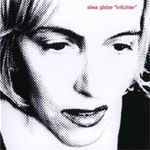
CD, Cuptose Records, 2005
www.alwaglebe.de
Alwa Glebe started to write music in a distant 1979 by forming a band called Index Sign, which went to release two albums at No Fun label in 1981 and 1982. After that she took part in several other music projects. In 1993 Alwa Glebe took the first steps in her solo carreer. In 1995 her collection of verses was published and a debut solo album in 1999 was released. “Irrlichter” is the second album in Alwa Glebe’s discography.
The singer’s vocal qualities are the main gamble of this album and its promotion, being frequently characterized in several review media as a dark angel voice. Basically it is all right to agree with such definition, nevertheless there’s a constant feeling of some kind of fake.
The music sounds like a pleasing, calm background, which (probably by the base idea) must not hinder the listener from being delighted by the vocals of Alwa Glebe, and consists of an eclectic mix of wave, pop and rock. It must be noted that the music in general is well written to fit the vocal of the singer, i.e the music composers – Lenart Lessmann & Alwa Glebe – completed their task successfully. When talking about lyrics, it must be noted that this is maybe the strongest part of the album and it not entirely surprising as Alwa, as stated above, has published works of poetry in the past. As an aside, one of the songs, “An der Brücke stand”, was created with the use of a poem by Friedrich Nietzsche.
The central failure of this album is the constant static melancholic mood and vocal style, which leads to quick annoyance of the album. The difference between tracks from the point of view of its contents and mood in vocals is quite paltry with a few exceptions. One, two, three tracks may sound interesting and intriguing, but all nine… It is clear that Alwa Glebe should work on diversifying of her repertoire. Another constant feeling during listening to this album is the sensation that many things, presented in the album, aren’t exactly new and can be easily hearfd on releases of other performers.
“Irrlichter” leaves a double impression: on the one hand it may sounds like interesting, pretty and even varied with relation to the music but, on the other hand, there’s a feeling of stereotyped and secondary work.
[6/10]
— Igor
